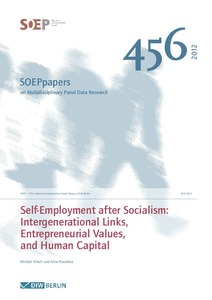Self-employment after socialism: intergenerational links, entrepreneurial values, and human capital
"Drawing on representative household data from the German Socio-Economic Panel, we examine the role of an early precursor of entrepreneurial development – parental role models – for the individual decision to become self-employed in the post-unified Germany. The findings suggest that the social...
| Main Authors: | , |
|---|---|
| Institution: | ETUI-European Trade Union Institute |
| Format: | TEXT |
| Language: | English |
| Published: |
Berlin
2012
DIW |
| Subjects: | |
| Online Access: | https://www.labourline.org/KENTIKA-19132658124919508309-Self-employment-after-socialis.htm |
| Summary: | "Drawing on representative household data from the German Socio-Economic Panel, we examine the role of an early precursor of entrepreneurial development – parental role models – for the individual decision to become self-employed in the post-unified Germany. The findings suggest that the socialist regime significantly damaged this mechanism of an intergenerational transmission of entrepreneurial attitudes among East Germans with a tertiary degree that have experienced a particularly strong ideological indoctrination. However, we find a significant and positive relationship between the presence of a parental role model and the decision to become self-employed for less-educated people. For West Germans the positive relationship holds irrespective of the level of education." |
|---|---|
| Physical Description: | 17 p. Digital |

